South of the Border, West of the Sun: Vintage International
Autor Haruki Murakamien Limba Engleză Paperback – 29 feb 2000
Born in 1951 in an affluent Tokyo suburb, Hajime--beginning in Japanese--has arrived at middle age wanting for almost nothing. The postwar years have brought him a fine marriage, two daughters, and an enviable career as the proprietor of two jazz clubs. Yet a nagging sense of inauthenticity about his success threatens Hajime's happiness. And a boyhood memory of a wise, lonely girl named Shimamoto clouds his heart.
When Shimamoto shows up one rainy night, now a breathtaking beauty with a secret from which she is unable to escape, the fault lines of doubt in Hajime's quotidian existence begin to give way. And the details of stolen moments past and present--a Nat King Cole melody, a face pressed against a window, a handful of ashes drifting downriver to the sea--threaten to undo him completely. Rich, mysterious, quietly dazzling, South of the Border, West of the Sun is Haruki Murakami's wisest and most compelling fiction.
| Toate formatele și edițiile | Preț | Express |
|---|---|---|
| Paperback (2) | 51.70 lei 26-32 zile | +16.67 lei 7-13 zile |
| Random House – iun 2000 | 51.70 lei 26-32 zile | +16.67 lei 7-13 zile |
| Vintage Publishing – 29 feb 2000 | 74.47 lei 3-5 săpt. | +8.41 lei 7-13 zile |
Din seria Vintage International
-
 Preț: 99.89 lei
Preț: 99.89 lei -
 Preț: 126.36 lei
Preț: 126.36 lei -
 Preț: 74.80 lei
Preț: 74.80 lei -
 Preț: 71.87 lei
Preț: 71.87 lei -
 Preț: 67.08 lei
Preț: 67.08 lei -
 Preț: 57.16 lei
Preț: 57.16 lei -
 Preț: 96.31 lei
Preț: 96.31 lei -
 Preț: 68.16 lei
Preț: 68.16 lei -
 Preț: 79.37 lei
Preț: 79.37 lei -
 Preț: 74.37 lei
Preț: 74.37 lei -
 Preț: 81.67 lei
Preț: 81.67 lei -
 Preț: 90.54 lei
Preț: 90.54 lei -
 Preț: 88.86 lei
Preț: 88.86 lei -
 Preț: 109.54 lei
Preț: 109.54 lei -
 Preț: 99.08 lei
Preț: 99.08 lei -
 Preț: 78.38 lei
Preț: 78.38 lei -
 Preț: 107.68 lei
Preț: 107.68 lei -
 Preț: 131.55 lei
Preț: 131.55 lei -
 Preț: 77.89 lei
Preț: 77.89 lei -
 Preț: 120.26 lei
Preț: 120.26 lei -
 Preț: 69.81 lei
Preț: 69.81 lei -
 Preț: 99.82 lei
Preț: 99.82 lei -
 Preț: 118.24 lei
Preț: 118.24 lei -
 Preț: 69.91 lei
Preț: 69.91 lei -
 Preț: 97.34 lei
Preț: 97.34 lei -
 Preț: 93.37 lei
Preț: 93.37 lei -
 Preț: 98.37 lei
Preț: 98.37 lei -
 Preț: 71.62 lei
Preț: 71.62 lei -
 Preț: 119.36 lei
Preț: 119.36 lei -
 Preț: 105.00 lei
Preț: 105.00 lei -
 Preț: 90.95 lei
Preț: 90.95 lei -
 Preț: 77.42 lei
Preț: 77.42 lei -
 Preț: 71.25 lei
Preț: 71.25 lei -
 Preț: 102.92 lei
Preț: 102.92 lei -
 Preț: 133.39 lei
Preț: 133.39 lei -
 Preț: 95.70 lei
Preț: 95.70 lei -
 Preț: 97.57 lei
Preț: 97.57 lei -
 Preț: 71.72 lei
Preț: 71.72 lei -
 Preț: 101.58 lei
Preț: 101.58 lei -
 Preț: 82.61 lei
Preț: 82.61 lei -
 Preț: 74.47 lei
Preț: 74.47 lei -
 Preț: 105.63 lei
Preț: 105.63 lei -
 Preț: 74.93 lei
Preț: 74.93 lei -
 Preț: 99.30 lei
Preț: 99.30 lei -
 Preț: 84.32 lei
Preț: 84.32 lei -
 Preț: 90.13 lei
Preț: 90.13 lei -
 Preț: 68.66 lei
Preț: 68.66 lei -
 Preț: 64.61 lei
Preț: 64.61 lei
Preț: 74.47 lei
Nou
14.25€ • 14.82$ • 11.77£
Carte disponibilă
Livrare economică 22 martie-05 aprilie
Livrare express 08-14 martie pentru 18.40 lei
Specificații
ISBN-10: 0679767398
Pagini: 224
Dimensiuni: 134 x 205 x 17 mm
Greutate: 0.22 kg
Editura: Vintage Publishing
Colecția Vintage Books
Seria Vintage International
Recenzii
“A probing meditation on human fragility, the grip of obsession, and the impenetrable, erotically charged enigma that is the other.” –The New York Times
“Brilliant. . . . A mesmerizing new example of Murakami’s deeply original fiction.” –The Baltimore Sun
“Lovely, deceptively simple. . . . A novel of existential romance.” –San Francisco Chronicle
“His most deeply moving novel.” –The Boston Globe
“Mesmerizing. . . . This is a harrowing, a disturbing, a hauntingly brilliant tale.” –The Baltimore Sun
“A fine, almost delicate book about what is unfathomable about us.” –The Philadelphia Inquirer
“Portrayed in a fluid language that veers from the vernacular . . . to the surprisingly poetic.” –San Francisco Examiner & Chronicle
“Haunting and natural. . . . South of the Border, West of the Sun so smoothly shifts the reader from mundane concerns into latent madness as to challenge one’s faith in the material world . . . contains passages that are among his finest.” –The New York Observer
“Haruki Murakami applies his patented Japanese magic realism–minimalist, smooth and transcendently odd–to a charming tale of childhood love lost.” –New York
Notă biografică
Extras
When I was born, though, you'd never have known there'd been a war. No more burned-out ruins, no more occupation army. We lived in a small, quiet town, in a house my father's company provided. The house was prewar, somewhat old but roomy enough. Pine trees grew in the garden, and we even had a small pond and some stone lanterns.
The town I grew up in was your typical middle-class suburb. The classmates I was friendly with all lived in neat little row houses; some might have been a bit larger than mine, but you could count on them all having similar entranceways, pine trees in the garden, the works. My friends' fathers were employed in companies or else were professionals of some sort. Hardly anyone's mother worked. And most everyone had a cat or a dog. No one I knew lived in an apartment or a condo. Later on I moved to another part of town, but it was pretty much identical. The upshot of this is that until I moved to Tokyo to go to college, I was convinced everyone in the whole world lived in a single-family home with a garden and a pet, and commuted to work decked out in a suit. I couldn't for the life of me imagine a different lifestyle.
In the world I grew up in, a typical family had two or three children. My childhood friends were all members of such stereotypical families. If not two kids in the family, then three; if not three, then two. Families with six or seven kids were few and far between, but even more unusual were families with only one child.
I happened to be one of the unusual ones, since I was an only child. I had an inferiority complex about it, as if there were something different about me, as if what other people all had and took for granted I lacked.
I detested the term "only child." Every time I heard it, I felt something was missing from me--like I wasn't quite a complete human being. The phrase stood there, pointing an accusatory finger at me. "Something's not quite all there, pal," it told me.
In the world I lived in, it was an accepted idea that only children were spoiled by their parents, weak, and self-centered. This was a given--like the fact that the barometer goes down the higher up you go and the fact that cows give milk. That's why I hated it whenever someone asked me how many brothers and sisters I had. Just let them hear I didn't have any, and instinctively they thought: An only child, eh? Spoiled, weak, and self-centered, I betcha. That kind of knee-jerk reaction depressed me, and hurt. But what really depressed and hurt me was something else: the fact that everything they thought about me was true. I really was spoiled, weak, and self-centered.
In the six years I went to elementary school, I met just one other only child. So I remember her (yes, it was a girl) very well. I got to know her well, and we talked about all sorts of things. We understood each other. You could even say I loved her.
Her last name was Shimamoto. Soon after she was born, she came down with polio, which made her drag her left leg. On top of that, she'd transferred to our school at the end of fifth grade. Compared to me, then, she had a terrible load of psychological baggage to struggle with. This baggage, though, only made her a tougher, more self-possessed only child than I could ever have been. She never whined or complained, never gave any indication of the annoyance she must have felt at times. No matter what happened, she'd manage a smile. The worse things got, in fact, the broader her smile became. I loved her smile. It soothed me, encouraged me. It'll be all right, her smile told me. Just hang in there, and everything will turn out okay. Years later, whenever I thought of her, it was her smile that came to mind first.
Shimamoto always got good grades and was kind to everyone. People respected her. We were both only children, but in this sense she and I were different. This doesn't mean, though, that all our classmates liked her. No one teased her or made fun of her, but except for me, she had no real friends.
She was probably too cool, too self-possessed. Some of our classmates must have thought her cold and haughty. But I detected something else--something warm and fragile just below the surface. Something very much like a child playing hide-and-seek, hidden deep within her, yet hoping to be found.
Because her father was transferred a lot, Shimamoto had attended quite a few schools. I can't recall what her father did. Once, she explained it to me in detail, but as with most kids, it went in one ear and out the other. I seem to recall some professional job connected with a bank or tax office or something. She lived in company housing, but the house was larger than normal, a Western-style house with a low solid stone wall surrounding it. Above the wall was an evergreen hedge, and through gaps in the hedge you could catch a glimpse of a garden with a lawn.
Shimamoto was a large girl, about as tall as I was, with striking features. I was certain that in a few years she would be gorgeous. But when I first met her, she hadn't developed an outer look to match her inner qualities. Something about her was unbalanced, and not many people felt she was much to look at. There was an adult part of her and a part that was still a child--and they were out of sync. And this out-of-sync quality made people uneasy.
Probably because our houses were so close, literally a stone's throw from each other, the first month after she came to our school she was assigned to the seat next to mine. I brought her up to speed on what texts she'd need, what the weekly tests were like, how much we'd covered in each book, how the cleaning and the dishing-out-lunch assignments were handled. Our school's policy was for the child who lived nearest any transfer student to help him or her out; my teacher took me aside to let me know that he expected me to take special care of Shimamoto, with her lame leg.
As with all kids of eleven or twelve talking with a member of the opposite sex for the first time, for a couple of days our conversations were strained. When we found out we were both only children, though, we relaxed. It was the first time either of us had met a fellow only child. We had so much we'd held inside about being only children. Often we'd walk home together. Slowly, because of her leg, we'd walk the three quarters of a mile home, talking about all kinds of things. The more we talked, the more we realized we had in common: our love of books and music; not to mention cats. We both had a hard time explaining our feelings to others. We both had a long list of foods we didn't want to eat. When it came to subjects at school, the ones we liked we had no trouble concentrating on; the ones we disliked we hated to death. But there was one major difference between us--more than I did, Shimamoto consciously wrapped herself inside a protective shell. Unlike me, she made an effort to study the subjects she hated, and she got good grades. When the school lunch contained food she hated, she still ate it. In other words, she constructed a much taller defensive wall around herself than I ever built. What remained behind that wall, though, was pretty much what lay behind mine.
Unlike times when I was with other girls, I could relax with Shimamoto. I loved walking home with her. Her left leg limped slightly as she walked. We sometimes took a breather on a park bench halfway home, but I didn't mind. Rather the opposite--I was glad to have the extra time.
Soon we began to spend a lot of time together, but I don't recall anyone kidding us about it. This didn't strike me at the time, though now it seems strange. After all, kids that age naturally tease and make fun of any couple who seem close. It might have been because of the kind of person Shimamoto was. Something about her made other people a bit tense. She had an air about her that made people think: Whoa--better not say anything too stupid in front of this girl. Even our teachers were somewhat on edge when dealing with her. Her lameness might have had something to do with it. At any rate, most people thought Shimamoto was not the kind of person you teased, which was just fine by me.
During phys. ed. she sat on the sidelines, and when our class went hiking or mountain climbing, she stayed home. Same with summer swim camp. On our annual sports day, she did seem a little out of sorts. But other than this, her school life was typical. Hardly ever did she mention her leg. If memory serves, not even once. Whenever we walked home from school together, she never once apologized for holding me back or let this thought graze her expression. I knew, though, that it was precisely because her leg bothered her that she refrained from mentioning it. She didn't like to go to other kids' homes much, since she'd have to remove her shoes, Japanese style, at the entrance. The heels of her shoes were different heights, and the shoes themselves were shaped differently--something she wanted at all costs to conceal. Must have been custom-made shoes. When she arrived at her own home, the first thing she did was toss her shoes in the closet as fast as she could.
Shimamoto's house had a brand-new stereo in the living room, and I used to go over to her place to listen to music. It was a pretty nice stereo. Her father's LP collection, though, didn't do it justice. At most he had fifteen records, chiefly collections of light classics. We listened to those fifteen records a thousand times, and even today I can recall the music--every single note.
Shimamoto was in charge of the records. She'd take one from its jacket, place it carefully on the turntable without touching the grooves with her fingers, and, after making sure to brush the cartridge free of any dust with a tiny brush, lower the needle ever so gently onto the record. When the record was finished, she'd spray it and wipe it with a felt cloth. Finally she'd return the record to its jacket and its proper place on the shelf. Her father had taught her this procedure, and she followed his instructions with a terribly serious look on her face, her eyes narrowed, her breath held in check. Meanwhile, I was on the sofa, watching her every move. Only when the record was safely back on the shelf did she turn to me and give a little smile. And every time, this thought hit me: It wasn't a record she was handling. It was a fragile soul inside a glass bottle.
In my house we didn't have records or a record player. My parents didn't care much for music. So I was always listening to music on a small plastic AM radio. Rock and roll was my favorite, but before long I grew to enjoy Shimamoto's brand of classical music. This was music from another world, which had its appeal, but more than that I loved it because she was a part of that world. Once or twice a week, she and I would sit on the sofa, drinking the tea her mother made for us, and spend the afternoon listening to Rossini overtures, Beethoven's Pastorale, and the Peer Gynt Suite. Her mother was happy to have me over. She was pleased her daughter had a friend so soon after transferring to a new school, and I guess it helped that I was a neat dresser. Honestly, I couldn't bring myself to like her mother very much. No particular reason I felt that way. She was always nice to me. But I could detect a hint of irritation in her voice, and it put me on edge.
Of all her father's records, the one I liked best was a recording of the Liszt piano concertos: one concerto on each side. There were two reasons I liked this record. First of all, the record jacket was beautiful. Second, no one around me--with the exception of Shimamoto, of course--ever listened to Liszt's piano concertos. The very idea excited me. I'd found a world that no one around me knew--a secret garden only I was allowed to enter. I felt elevated, lifted to another plane of existence.
And the music itself was wonderful. At first it struck me as exaggerated, artificial, even incomprehensible. Little by little, though, with repeated listenings, a vague image formed in my mind--an image that had meaning. When I closed my eyes and concentrated, the music came to me as a series of whirlpools. One whirlpool would form, and out of it another would take shape. And the second whirlpool would connect up with a third. Those whirlpools, I realize now, had a conceptual, abstract quality to them. More than anything, I wanted to tell Shimamoto about them. But they were beyond ordinary language. An entirely different set of words was needed, but I had no idea what these were. What's more, I didn't know if what I was feeling was worth putting into words. Unfortunately, I no longer remember the name of the pianist. All I recall are the colorful, vivid record jacket and the weight of the record itself. The record was hefty and thick in a mysterious way.
The collection in her house included one record each by Nat King Cole and Bing Crosby. We listened to those two a lot. The Crosby disc featured Christmas songs, which we enjoyed regardless of the season. It's funny how we could enjoy something like that over and over.
One December day near Christmas, Shimamoto and I were sitting in her living room. On the sofa, as usual, listening to records. Her mother was out of the house on some errand, and we were alone. It was a cloudy, dark winter afternoon. The sun's rays, streaked with fine dust, barely shone through the heavy layer of clouds. Everything looked dim and motionless. It was nearing dusk, and the room was as dark as night. A kerosene space heater bathed the room in a faint red glow. Nat King Cole was singing "Pretend." Of course, we had no idea then what the English lyrics meant. To us they were more like a chant. But I loved the song and had heard it so many times I could imitate the opening lines:
Pretend you're happy when you're blue
It isn't very hard to do
The song and the lovely smile that always graced Shimamoto's face were one and the same to me. The lyrics seemed to express a certain way of looking at life, though at times I found it hard to see life in that way.
Shimamoto had on a blue sweater with a round neck. She owned a fair number of blue sweaters; blue must have been her favorite color. Or maybe she wore those sweaters because they went well with the navy-blue coat she always wore to school. The white collar of her blouse peeked out at her throat. A checked skirt and white cotton socks completed her outfit. Her soft, tight sweater revealed the slight swell of her chest. She sat on the sofa with both legs folded underneath her. One elbow resting on the back of the sofa, she stared at some far-off, imaginary scene as she listened to the music.
"Do you think it's true what they say--that parents of only children don't get along very well?" she asked.
I mulled over the idea. But I couldn't figure out the cause and effect of it.
"Where did you hear that?" I asked.
"Somebody said that to me. A long time ago. Parents who don't get along very well end up having only one child. It made me so sad when I heard that."
"Hmm . . ." I said.
"Do your mother and father get along all right?"
I couldn't answer right away. I'd never thought about it before.
"My mother isn't too strong physically," I said. "I'm not sure, but it was probably too much of a strain for her to have another child after me."
"Have you ever wondered what it would be like to have a brother or sister?"
"No."
"Why not?"
I picked up the record jacket on the table. It was too dark to read what was written on it. I put the jacket down and rubbed my eyes a couple of times with my wrist. My mother had once asked me the same question. The answer I gave then didn't make her happy or sad. It just puzzled her. But for me it was a totally honest, totally sincere answer.
The things I wanted to say got all jumbled up as I talked, and my explanation seemed to go on forever. But what I was trying to get across was just this: The me that's here now has been brought up without any brothers or sisters. If I did have brothers or sisters I wouldn't be the me I am. So it's unnatural for the me that's here before you to think about what it'd be like to have brothers or sisters. . . . In other words, I thought my mother's question was pointless.
I gave the same answer to Shimamoto. She gazed at me steadily as I talked. Something about her expression pulled people in. It was as if--this is something I thought of only later, of course--she were gently peeling back one layer after another that covered a person's heart, a very sensual feeling. Her lips changed ever so slightly with each change in her expression, and I could catch a glimpse deep within her eyes of a faint light, like a tiny candle flickering in the dark, narrow room.
"I think I understand what you mean," she said in a mature, quiet voice.
"Really?"
"Um," she answered. "There are some things in this world that can be done over, and some that can't. And time passing is one thing that can't be redone. Come this far, and you can't go back. Don't you think so?"
I nodded.
"After a certain length of time has passed, things harden up. Like cement hardening in a bucket. And we can't go back anymore. What you want to say is that the cement that makes you up has hardened, so the you you are now can't be anyone else."
"I guess that's what I mean," I said uncertainly.
Shimamoto looked at her hands for a time.
"Sometimes, you know, I start thinking. About after I grow up and get married. I think about what kind of house I'll live in, what I'll do. And I think about how many children I'll have."
"Wow," I said.
"Haven't you ever thought about that?"
I shook my head. How could a twelve-year-old boy be expected to think about that? "So how many kids do you want to have?"
Her hand, which up till then had laid on the back of the sofa, she now placed on her knee. I stared vacantly at her fingers tracing the plaid pattern of her skirt. There was something mysterious about it, as if invisible thread emanating from her fingertips spun together an entirely new concept of time. I closed my eyes, and in the darkness, whirlpools flashed before me. Countless whirlpools were born and disappeared without a sound. Off in the distance, Nat King Cole was singing "South of the Border." The song was about Mexico, but at the time I had no idea. The words "south of the border" had a strangely appealing ring to them. I was convinced something utterly wonderful lay south of the border. When I opened my eyes, Shimamoto was still moving her fingers along her skirt. Somewhere deep inside my body I felt an exquisitely sweet ache.
"It's strange," she said, "but when I think about children, I can only imagine having one. I can somehow picture myself having children. I'm a mother, and I have a child. I have no problem with that. But I can't picture that child having any brothers or sisters. It's an only child."
She was, without a doubt, a precocious girl. I feel sure she was attracted to me as a member of the opposite sex--a feeling I reciprocated. But I had no idea how to deal with those feelings. Shimamoto didn't, either, I suspect. We held hands just once. She was leading me somewhere and grabbed my hand as if to say, This way--hurry up. Our hands were clasped together ten seconds at most, but to me it felt more like thirty minutes. When she let go of my hand, I was suddenly lost. It was all very natural, the way she took my hand, but I knew she'd been dying to do so.
The feel of her hand has never left me. It was different from any other hand I'd ever held, different from any touch I've ever known. It was merely the small, warm hand of a twelve-year-old girl, yet those five fingers and that palm were like a display case crammed full of everything I wanted to know--and everything I had to know. By taking my hand, she showed me what these things were. That within the real world, a place like this existed. In the space of those ten seconds I became a tiny bird, fluttering into the air, the wind rushing by. From high in the sky I could see a scene far away. It was so far off I couldn't make it out clearly, yet something was there, and I knew that someday I would travel to that place. This revelation made me catch my breath and made my chest tremble.
I returned home, and sitting at my desk, I gazed for a long time at the fingers Shimamoto had clasped. I was ecstatic that she'd held my hand. Her gentle touch warmed my heart for days. At the same time it confused me, made me perplexed, even sad in a way. How could I possibly come to terms with that warmth?
After graduating from elementary school, Shimamoto and I went on to separate junior highs. I left the home I had lived in till then and moved to a new town. I say a new town, but it was only two train stops from where I grew up, and in the first three months after I moved I went to see her three or four times. But that was it. Finally I stopped going. We were both at a delicate age, when the mere fact that we were attending different schools and living two train stops away was all it took for me to feel our worlds had changed completely. Our friends were different, so were our uniforms and textbooks. My body, my voice, my way of thinking, were undergoing sudden changes, and an unexpected awkwardness threatened the intimate world we had created. Shimamoto, of course, was going through even greater physical and psychological changes. And all of this made me uncomfortable. Her mother began to look at me in a strange way. Why does this boy keep coming over? she seemed to be saying. He no longer lives in the neighborhood, and he goes to a different school. Maybe I was just being too sensitive.
Shimamoto and I thus grew apart, and I ended up not seeing her anymore. And that was probably (probably is the only word I can think of to use here; I don't consider it my job to investigate the expanse of memory called the past and judge what is correct and what isn't) a mistake. I should have stayed as close as I could to her. I needed her, and she needed me. But my self-consciousness was too strong, and I was too afraid of being hurt. I never saw her again. Until many years later, that is.
Even after we stopped seeing each other, I thought of her with great fondness. Memories of her encouraged me, soothed me, as I passed through the confusion and pain of adolescence. For a long time, she held a special place in my heart. I kept this special place just for her, like a Reserved [[small caps--sign]] sign on a quiet corner table in a restaurant. Despite the fact that I was sure I'd never see her again.
When I knew her I was still twelve years old, without any real sexual feelings or desire. Though I'll admit to a vaguely formed interest in the swell of her chest and what lay beneath her skirt. But I had no idea what this meant, or where it might lead.
With ears perked up and eyes closed, I imagined the existence of a certain place. This place I imagined was still incomplete. It was misty, indistinct, its outlines vague. Yet I was sure that something absolutely vital lay waiting for me there. And I knew this: that Shimamoto was gazing at the very same scene.
We were, the two of us, still fragmentary beings, just beginning to sense the presence of an unexpected, to-be-acquired reality that would fill us and make us whole. We stood before a door we'd never seen before. The two of us alone, beneath a faintly flickering light, our hands tightly clasped together for a fleeting ten seconds of time.
Textul de pe ultima copertă
In South of the Border, West of the Sun, the simple arc of a man's life -- with its attendant rhythms of success and disappointment -- becomes the exquisite literary tableau of Haruki Murakami's most haunting work. When Shimamoto shows up one rainy night, now a breathtaking beauty with a secret from which she is unable to escape, the fault lines of doubt in Hajime's quotidian existence begin to give way. And the details of stolen moments past and present -- a Nat King Cole melody, a face pressed against a window, a handful of ashes drifting downriver to the sea -- threaten to undo him completely. Rich, mysterious, quietly dazzling, South of the Border, West of the Sun is Haruki Murakami's wisest and most compelling work.




















